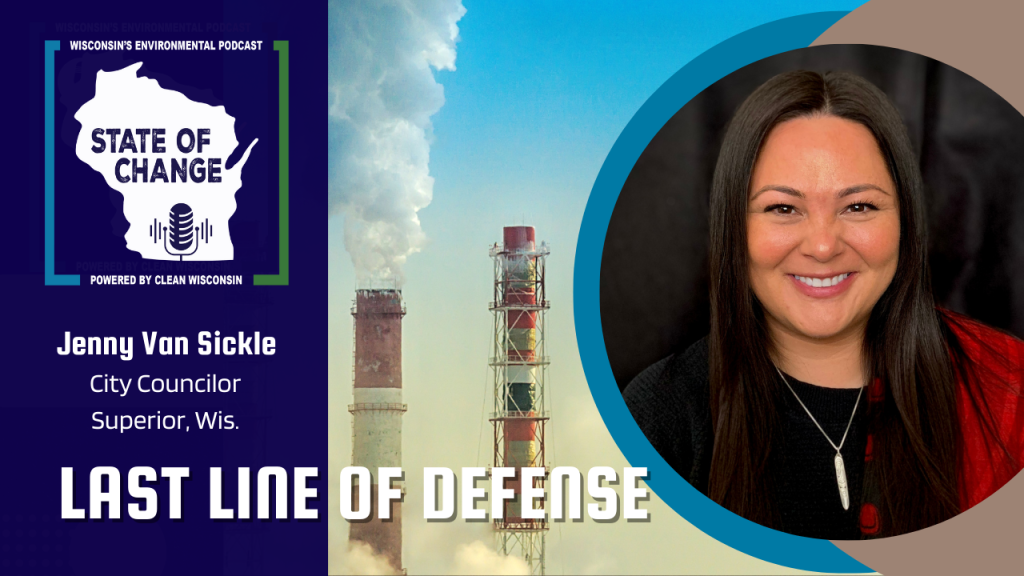Wisconsin’s Public Service Commission approved a large methane gas plant four years ago. The site: a bluff overlooking the Nemadji River in Superior. At the time, Superior’s city council unanimously supported the project. But it didn’t take long for opinions to change.
In this episode, Amy talks with Superior City Councilor Jenny Van Sickle who at first supported the plant and is now helping lead the charge to stop it. Find out what has changed — and what you can do to help.
Host:
Amy Barrilleaux
Guest :
Jenny Van Sickle, City of Superior Councilor
Background reading:
- Take Action Now: Call on federal officials to deny funding for the Nemadji Trail Energy Center
- Fighting the Nemadji Trail Energy Center gas plant
- Indigenous tribes urge federal officials to deny loan for Superior gas plant
Where to Listen:
Like ‘State of Change?’
Subscribe to State of Change on Apple Podcasts, Google Play Music, Spotify, or wherever you get your podcasts.
Be sure to rate our show and give us a review. It helps other people find us.
Like State of Change? Help support our podcast and our work to protect Wisconsin’s environment at www.cleanwisconsin.org/donate
Transcript:
Amy Barrilleaux: Nemadji Trail Energy Center. It’s a pleasant sounding name for a large 625 megawatt methane gas plant planned by Minnesota Power and Dairyland Power Cooperative near the state line in Superior. But there is a growing tide of opposition. Joining me is City of Superior City Council member Jenny Van Sickle. Tell me about this area where the utilities want to build their plant.
Jenny Van Sickle: So this is an area, on the Nemadji River. And, you know, this is an area that has absorbed a lot of industry over the years. And people might be familiar with this area because it boundaries the Saint Louis River Area of Concern. So this area has has had its fair share. This it’s about 20 acres on a bluff. What makes the area very unique and has spurred, you know, tribal opposition from — tribal nations across three states have spoken out on the placement of this gas plant, not only because it’s less than one mile from Lake Superior near this very fragile estuary. It is also about 150ft from a mass grave. And that is heinous on its own. But the reason that it’s so significant is, at the turn of the (20th) century, U.S. Steel comes to Superior and, you know, big dreams and big promises in the name of economic development. And they’d like to build an ore dock on Wisconsin Point. And, as it as it is, officials are tripping over themselves to do everything they can to get this done. And, this is going to save the community or this is going to really prop us up. And so Chief Joseph Ozaki, who is famous for being a signatory of the 1854 treaty, his descendants fight this ore dock being built on Wisconsin Point, which is a sacred, beautiful place. And they lose, they lose that fight. And the judge puts a boundary on where can be developed, puts a boundary excluding a sacred burial ground. The city of Superior is quoted saying something to the effect of, “Nothing is going to get in the way of this development.” So they challenge that boundary and win. And that turns into nearly 200 Ojibwe people being disinterred from their final resting place, including Chief Osagie himself. They load up the remains by the hundreds and um, and reinterred them in a mass grave on the river. And that is 150ft from this now proposed site. And it’s it’s such a dark second side to this coin, and I cannot think of an easier legacy to end.
Amy: This action was taken by the City of Superior more than 100 years ago. When you look back on that dark and wrong moment, do you feel some responsibility now as a city official to make sure that Superior lands on the right side of this this time?
Jenny: Absolutely. The city is responsible. And I think what’s most terrifying about the current situation that we’re in is, um, how easy it is to be complicit because, you know, they embed these representatives in your community. It’s like they almost get assigned to you and you start to forget why they’re actually in your life. And, these these representatives take seats at every table you’re at, and they follow you on social media, and they’re so friendly. I really think that it starts to feel like, these representatives are like, we have disassociated that, you know, Jen is going to go build a house on the river. And that is not what’s happening. Right. And the City of Superior did do what we could to be accountable to that, that crime against humanity. And we worked very hard over, you know, I mean, the Osage family, the descendants have worked over 100 years to get this correct. But, you know, I think I’m the first native woman elected to this body to represent Wisconsin Point. And we did work very hard to return the land, not only the sacred burial ground at Wisconsin Point, but also working with the church to return the mass grave to the Nation of Fond du Lac. And now, one year later, here we are. And what’s what’s upsetting about it is, you know, seeing clear eyed people, good people, not recognize that their ask is is unconscionable, in the tribe’s words, is unconscionable. And it’s really easy to take yourself out of that, out of that story. But as an elected official being asked to do this, we are being reinserted in that story.
Amy: Opponents of the plan also have concerns about the environmental harm, the, you know, sensitive waterways nearby, the air pollution and carbon pollution that come with burning methane. But I think supporters might say, look, we need the energy. Gas is so much cleaner than coal. And fears of this being a harm of it being an intrusion are overblown. What’s your reaction to that?
Jenny: You know, I think I think many doctors would agree it’s better to get stabbed than shot. But what’s really important to remember is, first of all, let’s call it what it is. It is fracked gas. This is not, you know, coming down from the heavens on unicorns. This is fracked gas. It is a violent process. And the process of having it fracked and distributed, as the EPA will tell you, is horrific poison. You know, I think, if coal plants are as bad as it gets and those are closing. This seems to be the now worst possible way to get to produce energy. I’m not I’m not here to debate energy policy. What I’m saying is the site is a nonstarter. And I, I was very, very early in my public service and I never could have — I wish I didn’t say anything at all. And it’s, you know, I look back on that decision with a lot of sorrow. It’s difficult to hear the utilities say “unanimous resolution.” It was 2019, and it was it was a bad decision and uninformed decision. It’s also a massive gas plant, you know, 625MW. So they claim, you know, their story changes here and there. But that is a massive, massive gas plant on the bluff of the river. You know, we don’t let people build decks or greenhouses in those places. We have the proof right to, to then, you know, at their, at their expert engineering’s opinion. It’s fine, but we’ve seen their experts be wrong so many times. You know, another example is their experts saying the the wetlands there are, you know, garbage and full of invasives and no rare species. And then to really get into those receipts and see how, how advantageous those assessments were to their client.
Amy: From the outside, it feels like there’s a change happening in Superior, where maybe back in 2019, folks thought, okay, we’ll accept this gas plant, we could make some revenue off of it, maybe get some jobs. And here we are in 2024. Are people in the community saying, wait a minute, we don’t feel like we want this here. This isn’t going to benefit our community like we hoped it would.
Jenny: Yeah. You know, I think when we look at state policy, no gas plant pays taxes. So I think that’s straight away something to clear up. This is not a facility that will pay taxes to the city of superior. The state of Wisconsin in 2009 created a flat per megawatt formula. So as the city’s expenses rise every single year, salaries, equipment, public safety, fire. This will stay flat. So it’s really, you know, it can be akin to a decreasing payment. And, you know, the state is really clear. They provide a utility aid payment to offset costs. So straight away we know, you know, you’re never in the black when it comes to a utility. Minnesota Power has raised its rates twice in 2023. We know that the community of Beloit, three years after they opened a gas plant there, they proposed the highest rate increases in the state. We know that just alone, based on the average increase of Minnesota Power’s increase that takes effect this month — so Minnesota Power owns our utility. So that is where we get our power. If you’re wondering how does that affect Superior, Superior, Water Light and Power okay. So just based on their rate increases this year alone, the citizens of Superior will send $1.5 million extra over to Minnesota Power this year alone. So they’re estimating in 2028 we might get $800,000 a year. There is no benefit. There is no gain. Now, when you talk about construction, absolutely. People will be able to build something. But as a public official, it’s my job to look into that space just beyond construction and reckon with what is it we are left with? And that to me, is not enough. You know, in 2019, Minnesota Power promised 260 jobs at peak construction. They also went on to attest in 2021, that number had dropped to 150 jobs at peak construction. Annd at the first whiff of controversy, the first whiff of opposition, that number suddenly ballooned to 350. And you know, I’m not I’m not surprised because their their information has been egregiously inconsistent over the years.
Amy: Clean Wisconsin has been fighting the Nemadji Trail Energy Center in court since 2020. The case is currently at the Court of Appeals, but it can seem like an uphill battle. You know, you have PSC approval, you have the federal Rural Utilities Service considering a $350 million publicly subsidized loan to help Dairyland pay for the gas plant. Sometimes it feels like when power companies want to do someSthing, they basically get to do it. Um, what in your mind needs to happen for this plant to not get built in uperior?
Jenny: You know, I think them sticking to a statement that they will respect the city of Superior is important. They have spent a lot of time saying that Superior is their backyard, too, and that we have such a close, close community partnership, and that’s why they chose us. Um. If that is true. I look forward to working on the next project. If it’s not true, I suspect they’ll call us into court. So which is it? You know, the city of Superior has been, has been left in a lurch. And just like the community of Beloit, that is also a border community. Also on the outskirts of the state. That’s unacceptable. When we point out inconsistencies and falsehoods, there is a tendency for people to say, oh, we’re so far along. And if the oversight had met the standard that everybody’s claiming, I don’t think we would be this far, and we’re the last line of defense to protect our, our, our sacred spaces, our water, our air. And I know that sounds really fluffy, but here’s the truth. This gas plant will push Superior to the absolute threshold, the absolute ceiling on our our allowable pollution. So it’s it’s accurate to say how anti-development this plant is because it’ll be our last.
Amy: What needs to happen next? How can people, both in the community and outside of the community make a difference in this?
Jenny: The Army Corps of Engineers has not issued a wetland permit, and the RUS has not issued the public money that the EPA has warned them from issuing. There are there are levers. Learning what this is rather than the soundbites. And the disinformation is going to be really important. I give you sources and let you, you know, decide. Um, and that’s, that’s ultimately how I came to my decision. You know, my, my residents in East End are demanding it be stopped. So however friendly Minnesota Power has been, my job, my oath is to citizens. I didn’t take an oath to Minnesota Power, and I don’t intend to start now.
Amy: What do you worry will happen if this large gas plant gets built on that bluff overlooking the river?
Jenny: I have looked very hard to find any benefit to have it be built in any community, but I cannot think of a more vulnerable site than having it built on a. Eroding, verifiably eroding bluffs. You know, FEMA had to step in a few years ago twice on the Nemadji River, very close to this site, because a home was was being pulled into the river. Or one of our main collector roads was so badly washed out by the river that FEMA had to supply money to, to rebuild it and reinforce it. Our ordinances say a greenhouse couldn’t be built there, a residential domestic little greenhouse because it’s too dangerous. I can imagine this is this is stable in any way, shape or form.
Amy: What can people who are listening to this right now do to help folks in superior who are trying to stop this?
Jenny: You know, I’d love to hear from residents that live by these gas plants. You know, there have been people that have been reaching out all over the state that are tracking their emissions or, um, talking about how loud and noisy these are and, you know, being able to compare what was promised and what actually ended up happening. I’ve tried to look into some research around, um, you know, education investment or different, different metrics that would, that would lend any evidence that communities are better off when these are built. I just am not able to find them.
Amy: Jenny Van Sickle, Superior City Councilor, thank you so much for being a leading voice in this and for talking with me today.






